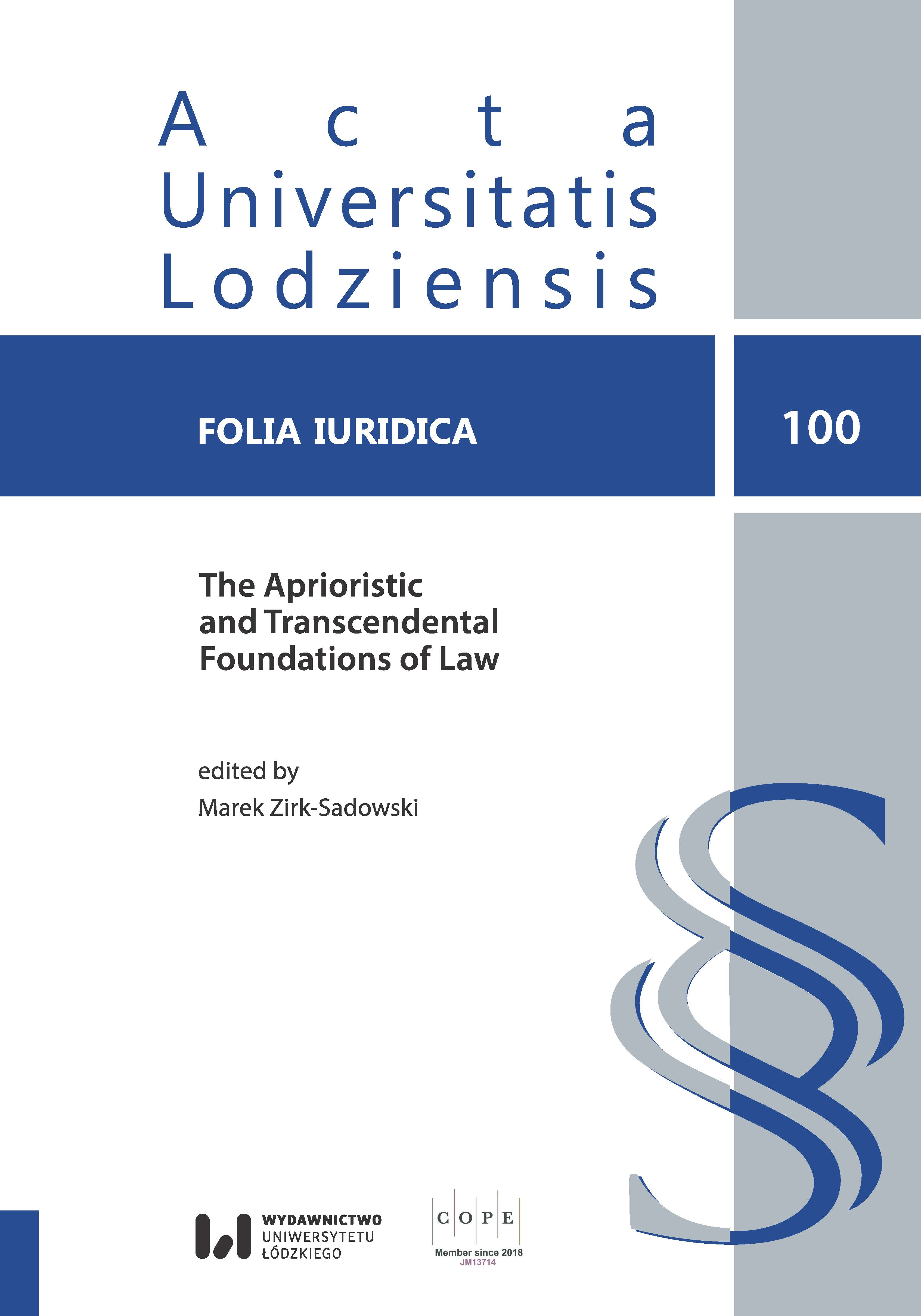Obowiązek i wartość w fenomenologii prawa (prace Edmunda Husserla)
DOI:
https://doi.org/10.18778/0208-6069.100.04Słowa kluczowe:
zasada wszystkich zasad, postawa wartościująca, fenomenologia, 'noesis', 'noemat', konstytuowanie świata, redukcja fenomenologiczna, 'ego' i 'alter ego'Abstrakt
Opierając się na dwóch fundamentalnych pracach Edmunda Husserla (Logische Untersuchungen i Idee) autor przedstawia Husserlowskie koncepcje obowiązku i wartości według redukcji fenomenologicznej i teorii ukonstytuowania się przedmiotów. W kontekście redukcji wnioski są następujące: jak według Husserla istota zdań normatywnych w wycenie, problemy obowiązku można sprowadzić do problemów wyceny. Sens (Sinn) okazuje się fundamentalny przed istnieniem. Jeśli cokolwiek ma powstać w znaczeniu ontologicznym, musi stać się momentem zamierzonego życia świadomości. Dlatego przedmiot i wartość istnieją w ten sam sposób, ale są tylko różnymi nazwami niektórych jednostek zmysłu. Różnica staje się wyraźniejsza na „wyższym” poziomie, gdy są one scharakteryzowane jako celowe obiekty i celowe doświadczenie skierowane do nich. W przeciwieństwie do przedmiotów możemy być skierowani ku wartościom w sposób dostrzegalny (erfassenseise). Doświadczenie wartości jest zawsze aktem opartym na drodze. Akty te są analizowane na tle noesis i noema. Na scenie ukonstytuowania się świata wydaje się jednak, że istotę moralności nie można poznać poza postawą personalistyczną.
Pobrania
Bibliografia
Desanti, Jean T. 1963. Phenomenologie et praxis. Paris: Éditions sociales.
Google Scholar
Husserl, Edmund. 1900–1901. Logische Untersuchungen. Lepzig: M. Niemeyer, Routledge & Kegan Paul.
Google Scholar
Husserl, Edmund. 1973. Logical Investigations. Translated by John Niemeyer Findlay. London: Routledge.
Google Scholar
Husserl, Edmund. 1983. Ideas Pertaining to a Pure Phenomenology and to a Phenomenological Philosophy – First Book: General Introduction to a Pure Phenomenology. Translated by F. Kersten. Hague: Springer. https://doi.org/10.1007/978-94-009-7445-6
Google Scholar
DOI: https://doi.org/10.1007/978-94-009-7445-6
Husserl, Edmund. 1989. Ideas Pertaining to a Pure Phenomenology and to a Phenomenological Philosophy: Second Book Studies in the Phenomenology of Constitution. Translated by R. Rojcewicz, A. Schuwer. Dordrecht: Kluwer Academic.
Google Scholar
Kotarbiński, Tadeusz. 1961. Elementy teorii poznania, logiki formalnej i metodologii nauk. [Elements of Theory of Cognition, Formal Logic and Methodology of Sciences]. Wrocław: Zakład Narodowy im. Ossolińskich.
Google Scholar
Lande, Jerzy. 1959. Studia z filozofii prawa. [Studies of Philosophy of Law]. Warszawa: Państwowe Wydawnictwo Naukowe.
Google Scholar
Marciszewski, Witold. 1970. Mała encyklopedia logiki. [Small Encyclopedia of Logic]. Wrocław: Zakład Narodowy im. Ossolińskich.
Google Scholar
Opałek, Kazimierz. 1974. Z teorii dyrektyw i norm. [Out of the Theory of Directives and Norms]. Warszawa: Państwowe Wydawnictwo Naukowe.
Google Scholar
Ossowska, Maria. 1957. Podstawy nauki o moralności. [Fundamentals of Studies of Morality]. Warszawa: Państwowe Wydawnictwo Naukowe.
Google Scholar
Półtawski, Andrzej. 1973. Świat, spostrzeżenie, świadomość. [The World, Perception, Awareness]. Warszawa: Państwowe Wydawnictwo Naukowe.
Google Scholar
Pobrania
Opublikowane
Jak cytować
Numer
Dział
Licencja

Utwór dostępny jest na licencji Creative Commons Uznanie autorstwa – Użycie niekomercyjne – Bez utworów zależnych 4.0 Międzynarodowe.














